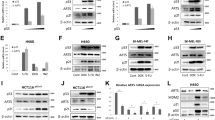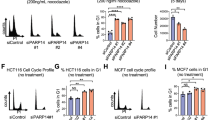Abstract
The cAMP pathway plays a central role in the response to hormonal signals for cell proliferation, differentiation and apoptosis. In IPC-81 leukaemia cells, activation of the cAMP pathway by prostaglandin E1 treatment, or other cAMP-elevating agents, induces apoptosis within 4 – 6 h. Inhibition of mRNA or protein synthesis during the first 2 h of cAMP induction protects cells from apoptosis, suggesting a requirement for early gene expression. cAMP-dependent protein kinase phosphorylates a class of nuclear factors and thereby regulates the transcription of a specific set of genes. Here we show that CREM (cAMP Responsive Element Modulator) expression is induced rapidly upon prostaglandin E1 treatment of IPC-81 cells. The induced transcripts correspond to the early product ICER (Inducible cAMP Early Repressor). ICER expression remains elevated until the burst of cell death. Protein synthesis inhibitors which prevent cAMP-induced apoptosis also block de novo ICER synthesis. Transfected IPC-81 cell lines, constitutively expressing high level of ICER are resistant to cAMP-induced cell death. In these transfected cells, cAMP fails to upregulate the ICER transcripts demonstrating that ICER exerts strongly its repressor function on CRE-containing genes. That an early expression of ICER blocks apoptosis, suggests that gene repression by endogenous ICER in IPC-81 is unsufficient or occurs too late to protect cells against death. ICER transfected cells rescued from cAMP-induced apoptosis are growth arrested. It shows for the first time that CREM activation directly participates to the decision of the cell to die. ICER, by sequentially repressing distinct sets of CRE-containing genes could modulate cell fate.
This is a preview of subscription content, access via your institution
Access options
Subscribe to this journal
Receive 50 print issues and online access
$259.00 per year
only $5.18 per issue
Buy this article
- Purchase on Springer Link
- Instant access to full article PDF
Prices may be subject to local taxes which are calculated during checkout
Similar content being viewed by others
Author information
Authors and Affiliations
Rights and permissions
About this article
Cite this article
Ruchaud, S., Seité, P., Foulkes, N. et al. The transcriptional repressor ICER and cAMP-induced programmed cell death. Oncogene 15, 827–836 (1997). https://doi.org/10.1038/sj.onc.1201248
Received:
Revised:
Accepted:
Issue Date:
DOI: https://doi.org/10.1038/sj.onc.1201248
Keywords
This article is cited by
-
Cyclic AMP induces IPC leukemia cell apoptosis via CRE-and CDK-dependent Bim transcription
Cell Death & Disease (2011)
-
Inducible cAMP Early Repressor (ICER) and Brain Functions
Molecular Neurobiology (2009)
-
Increased and correlated nuclear factor-kappa B and Ku autoantigen activities are associated with development of multidrug resistance
Oncogene (2001)
-
Ectopic expression of Bcl-2 switches over nuclear signalling for cAMP-induced apoptosis to granulocytic differentiation
Cell Death & Differentiation (2000)
-
Control of apoptosis of cardiovascular fibroblasts: A novel drug target
Herz (1999)



